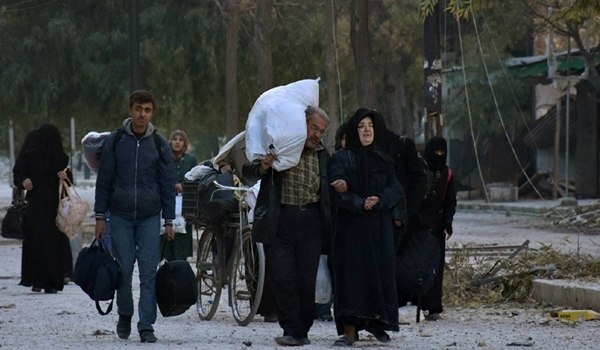
RNA - The Arabic-language desk of Sputnik quoted the Russian Kommersant daily as saying that four zones of de-escalation will be created in Idlib province, Northern Homs, Eastern Ghouta and Southern Syria.
It added that based on the plan the zones will be emptied of weapons as there will be a tight ban on the use of firearms in these zones.
The paper went on to say that the four zones will be open to humanitarian organizations, adding that construction operation of civil infrastructures will start in the zones.
The paper added that according to the plan, several checkpoints will be erected at the borderlines of these four zones for inspection to ease transfer of civilians and humanitarian aids.
The inspection and checking points will operate under the supervision and guarding of the foreign military forces guaranteed by Russia, Turkey and Iran.
According to a source in one of the delegations at the talks, the document on the creation of four zones of de-escalation in Syria has been finalized with ceasefire guarantor states in Astana now having differences on one provision.
"Work continues. The document is almost ready. There are discussions now on one provision only," the source said Thursday.
The source added that the likelihood of the document's adoption is "98-99 percent."
An official source at the Syrian Foreign Ministry announced earlier today that Damascus supports the Russian initiative on the creation of zones of de-escalation and stresses commitment to the agreement on the cessation of hostilities signed on December 30, 2016.
The source said that in light of the Syrian Republic’s commitment to preserve the lives of the Syrian people and stop the bloodshed, and based on its readiness to agree on everything that would help the people return to their normal life as much as possible, activating and reinforcing the Syrian economy, and raising the living standards of the citizens who have suffered from the war imposed on Syria, and in line with its assertion on the country’s territorial integrity and sovereignty, the Syrian government is resolved to support the Russian initiative on the de-escalation zones and the cessation of hostilities agreement signed on December 30th, 2016, including not shelling those regions.
The official went on to say that Damascus underlines continuation of anti-terrorism operation of the army and its allied forces against ISIL, the Al-Nusra Front (also known as Fatah al-Sham Front or the Levant Liberation Board) and other affiliated terrorist organizations wherever they were all over the Syrian territories.
The fourth round of international talks on Syria kicked off in Astana on Wednesday.
The talks are to last two days.
Bilateral meetings is to be held on Thursday, while, a general plenary session is scheduled.
Following the meetings, there are plans to adopt a number of documents, including on four safe zones in Syria.
The international meeting on Syria began in the Kazakh capital of Astana on Wednesday. This is the fourth round of talks on Syria Astana hosts since the beginning of the year.
According to the meeting agenda, the delegations spent the first day in consultations and on May 4 a plenary session will be held, TASS reported.
On the eve of the forum, expert discussions took place between the official Damascus and Iran, Russia and Turkey, Iran and Turkey.
Russia’s delegation in Astana is led by the presidential special envoy for the Syrian crisis settlement Alexander Lavrentiev, Iran's delegation is headed by Deputy Foreign Minister Hossein Ansari, and Turkey's delegation is led by Deputy Foreign Minister Sedat Onal.
Special representative of the UN Secretary-General Staffan de Mistura and Nauaf Oufi Tel, political adviser to Jordan’s Foreign Minister, will take part in the meeting as observers.
For the first time, the US will be represented on a higher level at the meeting, US Assistant Secretary of State for Middle East Affairs Stuart Jones was scheduled to partake in Astana talks.
The delegation of the Syrian government is headed by the permanent representative of Syria to the United Nations, Bashar Jafari, while the delegation of the armed opposition led by the representative of the Jeish al-Islam group Mohammed Allush.
Russia, Iran and Turkey have set up a joint task force to monitor the ceasefire in Syria.
On the eve of the Astana meeting media reported that Russia suggested establishing four zones to reduce tension in Syria. It is assumed that the military guarantor countries will be sent to these areas for monitoring.
Earlier, Yahya al-Aridi, adviser to the opposition’s Supreme Committee on Negotiations told TASS it was possible that this topic would be discussed. At the same time, there was no official confirmation of the existence of such initiatives of the Russian party.
847/940